Recently, I wrote a piece asking why taking action is hard. Why do we so often struggle to take our ideas and actually do something about them? It’s tempting to just say people are lazy or unmotivated, but I think the question is a lot more complex and interesting than it first appears.
Related to this question is what makes something effortful? Why is it “easier” to watch Netflix than solve math problems?
Like taking action, this question risks being overlooked because of our familiarity with it. It’s “obvious” to us that television is easier than algebra, so we don’t bother to ask why. However, like action, I think effort is also more mysterious than it first appears.
Effort as Energy Expenditure
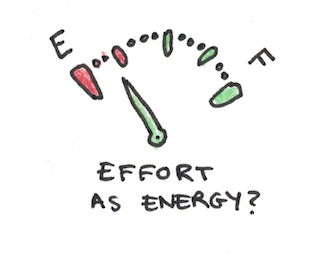
A simple view of effort is that it simply represents an investment of a fixed resource, possibly calories or glucose.
Running is more effortful than sitting for this reason. If you run constantly, you use up more calories than sitting, and thus need to eat more to stay alive. Since calories were historically scarce, it might be that we have an aversion to effort because it keeps us from wasting energy.
Running also strains muscles and joints (if done excessively) so there’s another possible reason for making it harder. If you run non-stop, eventually your muscles will wear out, so preventing strain and damage to your body may also be involved in the effort in some activities.
This simple idea makes sense, but it breaks down when you consider it carefully. For starters, many activities that have similar caloric consumption or wear-and-tear on the body have wildly different amounts of effort required. Watching lectures in physics isn’t going to consume more calories than YouTube.
Neurological studies also show that glucose consumption in the brain, which was one of the hypothesized constraints for effort, doesn’t change very much when mental effort is changed, so this doesn’t work as a good explanation for effort.
Finally, sometimes we like to get up and move, expending more effort, rather than sitting still. Playing tennis is much more fun (and less effortful) than staring at a blank wall all afternoon, but the former burns way more energy.
Effort as Attention
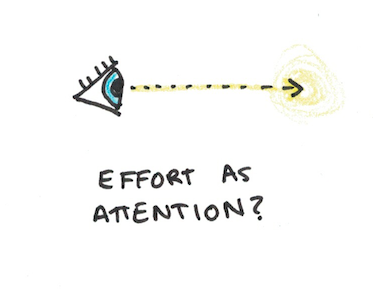
Other research points to a link between effort and the conscious mind. Attention seems to be linked to effort, as the deliberate control of attention is effortful. Daniel Kahneman, best known for his work on cognitive biases, even published a book arguing for this connection, Attention and Effort.
Still, attention alone can’t be the only explanation for effort. Some things are effortless to pay attention to, while others are hard to focus on for more than a few minutes. Watching an action movie and meditating to the flow of your own breath clearly illustrates that the object of your attention plays a big role in how effortful it is to sustain.
What makes focusing hard is that we’re trying to focus. That attention isn’t being held automatically, and thus needs conscious control, seems to be the relevant part for effort.
Effort as the Opposite of Habit
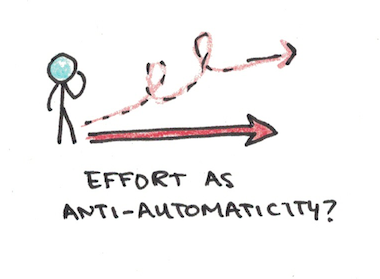
Another view of effort might be that it’s the opposite of something we do automatically. Certain behaviors and patterns occur automatically. This could be because they’re acquired habits or skills, such as always brushing your teeth before sleeping or knowing how to drive a car. Other automatic behaviors are instinctive, like pulling your hand away from fire.
Effort, then, is what happens when we try to override an automatic pattern. Driving isn’t effortful, except when you change countries and have to drive on the other side of the road. Then you’re counteracting learned behaviors, and this requires effort.
This would explain the difference between Netflix and calculus in terms of effort. For most of us, the latter involves a lot more conscious control of our thoughts and behavior, and therefore a lot more effort.
This explanation isn’t without issues, however. Games are often feel effortless, but they often require many deliberate actions that aren’t determined by habits. Doing household chores requires more “effort” yet this requires far less executive control over attention.
Effort as Moving Against the Balance of Rewards
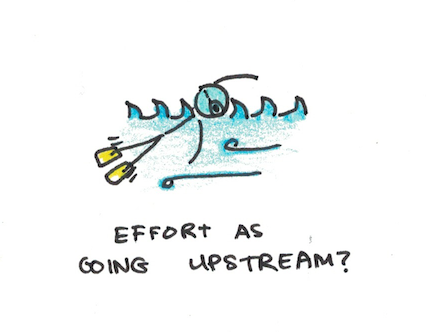
Still another way of looking at effort might be to see it as occurring whenever you need to make a choice that involves some internal conflict. Part of you wants to eat another cookie, but a part of you thinks you probably shouldn’t. This tug of war between different parts of yourself makes self-control effortful.
In this view of the mind, we all flow towards certain default behaviors like a river flowing downhill. What requires effort is moving “uphill” or resisting this downward gravity.
What defines the path of least resistance, instead of gravity, is something akin to a balance of pleasure or pain. The more strongly an activity is associated with an immediate reward, the less effort it requires to continue. The more you need to override an action that flows along a path of greater reward, the more effort is required.
Are There Different Kinds of Effort?
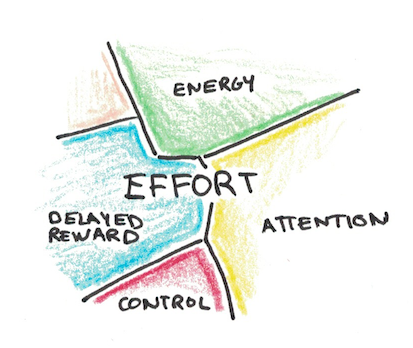
I’ve given a handful of possible theories of effort, and there are likely more that I’ve missed. Rather than one of these being unequivocally correct, it may also be the case that the word “effort” encompasses distinct phenomena that aren’t always related.
So there may be a physical effort associated with calorie expenditure, that explains why you’re exhausted after an otherwise enjoyable soccer game, but that this effort is different from the kind spent working on math problems all day.
Similarly, there may be an effort involved in controlling attention, overriding automatic behavior patterns or otherwise choosing a path that has less short-term reward than competing options. These may actually be different kinds of difficulty, with different features and different obstacles, even though we often classify them as all requiring “effort.”
What Would Different Efforts Mean for Taking Action?
Returning to the question I asked previously about why taking action is hard, effort is clearly a factor. Action is hard because it requires effort. While that sentence is dangerously close to a tautology, it does match the phenomenon we have all experienced: some things feel easy and others feel difficult and this is a major reason we don’t always follow through on our plans.
Resolving this problem would have huge implications for our lives. If we could consistently follow-through on our plans, our lives would be much happier, more productive and successful. Even if following through on everything turned out to be impossible (as it likely is), then at least the self-awareness of when action won’t be forthcoming could allow us to accept our fate.
Yet, as the above explanations show, part of the issue might be that we’ve lumped together distinct problems: physical fatigue, attention control, automaticity, self-control, all under the label of “effort.” If we could tease apart these different impacts on the effort required for different tasks, we might be able to make changes to our environment, goals or tasks to ease the effort required to finally take action.
My own thoughts are that it’s hard to deceive ourselves about the effort of an activity. At the same time, the effort required to do things isn’t static. Habits and learning make frustrating things automatic. Our environment constrains our choices. Rewards for effort change as you do more of something.
All of these things suggest that even if exerting effort is hard, there may be detours that allow us to make some actions less effortful than they might be now. This would not only have implications for taking action, but also living better, given the amount of difficult things we need to do.
What are your thoughts? Why do you think some activities are harder than others? What might we do to shape the perceived effort ahead to struggle less with doing hard things?


 I'm a Wall Street Journal bestselling author, podcast host, computer programmer and an avid reader. Since 2006, I've published weekly essays on this website to help people like you learn and think better. My work has been featured in The New York Times, BBC, TEDx, Pocket, Business Insider and more. I don't promise I have all the answers, just a place to start.
I'm a Wall Street Journal bestselling author, podcast host, computer programmer and an avid reader. Since 2006, I've published weekly essays on this website to help people like you learn and think better. My work has been featured in The New York Times, BBC, TEDx, Pocket, Business Insider and more. I don't promise I have all the answers, just a place to start.